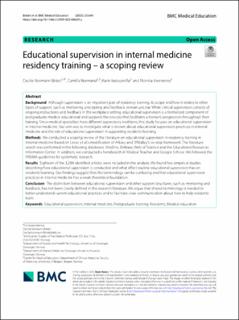| dc.contributor.author | Birkeli, Cecilie Normann | |
| dc.contributor.author | Normand, Camilla Jacqueline Hansine | |
| dc.contributor.author | Rø, Karin Isaksson | |
| dc.contributor.author | Kvernenes, Monika | |
| dc.date.accessioned | 2024-02-21T09:20:31Z | |
| dc.date.available | 2024-02-21T09:20:31Z | |
| dc.date.created | 2023-09-27T10:12:24Z | |
| dc.date.issued | 2023 | |
| dc.identifier.citation | Birkeli, C. N., Normand, C., Rø, K. I., & Kvernenes, M. (2023). Educational supervision in internal medicine residency training–a scoping review. BMC Medical Education, 23(1), 644. | en_US |
| dc.identifier.issn | 1472-6920 | |
| dc.identifier.uri | https://hdl.handle.net/11250/3118906 | |
| dc.description.abstract | Background
Although supervision is an important part of residency training, its scope and how it relates to other types of support, such as mentoring, precepting and feedback, remain unclear. While clinical supervision consists of ongoing instructions and feedback in the workplace setting, educational supervision is a formalized component of postgraduate medical educational and supports the process that facilitates a trainee’s progression throughout their training. Since medical specialties have different supervisory traditions, this study focuses on educational supervision in internal medicine. Our aim was to investigate what is known about educational supervision practices in internal medicine and the role of educational supervision in supporting residents’ learning.
Methods
We conducted a scoping review of the literature on educational supervision in residency training in internal medicine based on Levac et al.’s modification of Arksey and O’Malley’s six-step framework. The literature search was performed in the following databases: Medline, Embase, Web of Science and the Educational Resources Information Center. In addition, we conducted a handsearch in Medical Teacher and Google Scholar. We followed the PRISMA guidelines for systematic research.
Results
Eighteen of the 3,284 identified articles were included in the analysis. We found few empirical studies describing how educational supervision is conducted and what effect routine educational supervision has on residents’ learning. Our findings suggest that the terminology can be confusing and that educational supervision practices in internal medicine has a weak theoretical foundation.
Conclusion
The distinction between educational supervision and other support structures, such as mentoring and feedback, has not been clearly defined in the research literature. We argue that shared terminology is needed to better understand current educational practices and to facilitate clear communication about how to help residents learn. | en_US |
| dc.language.iso | eng | en_US |
| dc.publisher | BMC | en_US |
| dc.rights | Navngivelse 4.0 Internasjonal | * |
| dc.rights.uri | http://creativecommons.org/licenses/by/4.0/deed.no | * |
| dc.title | Educational supervision in internal medicine residency training – a scoping review | en_US |
| dc.type | Peer reviewed | en_US |
| dc.type | Journal article | en_US |
| dc.description.version | publishedVersion | en_US |
| dc.rights.holder | The authors | en_US |
| dc.subject.nsi | VDP::Medisinske Fag: 700 | en_US |
| dc.source.volume | 23 | en_US |
| dc.source.journal | BMC Medical Education | en_US |
| dc.source.issue | 1 | en_US |
| dc.identifier.doi | 10.1186/s12909-023-04629-y | |
| dc.identifier.cristin | 2179270 | |
| cristin.ispublished | true | |
| cristin.fulltext | original | |
| cristin.fulltext | original | |
| cristin.qualitycode | 1 | |

